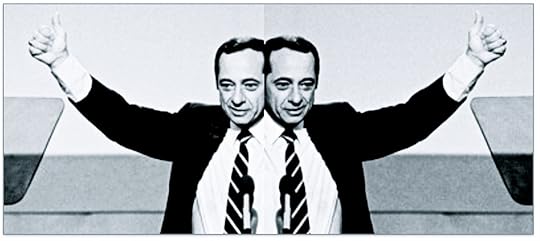Greg Palast's Blog, page 90
January 9, 2015
Cartoonist Ted Rall Joins Palast Investigations Team
A note from Greg Palast
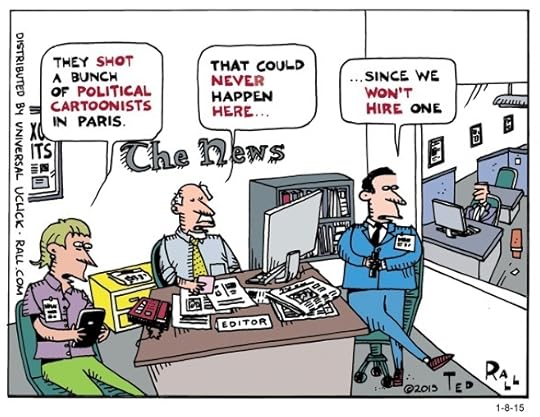 With the blood of cartoonists still fresh on the walls of Charlie Hebdo in France, I thought I’d move up the announcement that poison pen-man Ted Rall has been named a Fellow of the Palast Investigative Fund.
With the blood of cartoonists still fresh on the walls of Charlie Hebdo in France, I thought I’d move up the announcement that poison pen-man Ted Rall has been named a Fellow of the Palast Investigative Fund.
Now you can sign up to receive Ted’s ‘toons and tales weekly, no charge.
Why the heck does an investigative reporting team need a guy who draws the funnies? Ted is, in fact, one of the USA’s top journalists—reporting from Afghanistan (“After We Kill You, We Will Welcome You Back as Honored Guests”) and the other places too scary to go to yourself—and from the belly of the New York beast.
The fact that Rall’s reports often come out as punch-lines in word balloons just makes his work even more brilliant.
Download one of Ted’s masterpieces, “To Afghanistan and Back,” for FREE.
We are honored to give Rall more opportunities to put himself in danger.
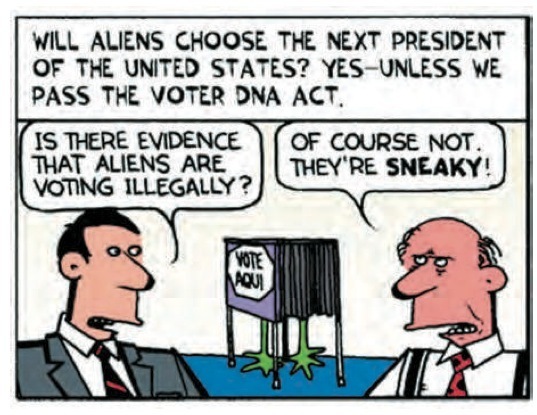 And be honest: How many of you bought my bestseller, Billionaires & Ballot Bandits, but only read Ted’s comic book included with it? (Like this brilliant Aliens Attack illustration.)
And be honest: How many of you bought my bestseller, Billionaires & Ballot Bandits, but only read Ted’s comic book included with it? (Like this brilliant Aliens Attack illustration.)
Ted, who lived in France, knew and got sloshed with the Charlie Hebdo crew. He writes,
"I was thinking about that this morning when I heard NPR’s Eleanor Beardsley call Charlie Hebdo “gross” and “in poor taste.” (I should certainly hope so! If it’s in good taste, it ain’t funny.)”
Like Rodney Dangerfield, cartoonists, says Rall, “get no respect.”
Hey, that makes him a perfect candidate for the Palast team. It’s an unusual fellowship: As our fund is skint, we are granting him an award of exactly Zero dollars—though my daughter will make up a nice card.
What we have offered instead, is a chance for him to give you his columns for free—and to give away one of his books. But while you’re scarfing up the freebies, I’m asking you to make a tax-deductible donation to the Fund. Every dime and dollar collected on that page goes to Ted’s work. And Ted will send a signed copy of his to-die-for books of cartoons and reportage in thanks.
Rall notes, “There could never be a mass shooting of staff political cartoonists in the United States, because American newspapers and magazines have fired almost all of them.”
Instead, cartoonists, even one’s of Rall’s international stature, get paid at sweatshop piece-work rates. He’d be better off sewing sneakers for Nike.
Now that Ted is on our team, he can illustrate our planned book compiling the death threats we’ve received over the years. But first, Ted will be animating our film investigations. (See his ‘toons in motion on our DVD Vultures and Vote Rustlers.)
Ted Rall’s pen is mightier than (most) swords. Help us keep it loaded. Sign up—and donate now.
* * * * *
Greg Palast is the author of the New York Times bestsellers Billionaires & Ballot Bandits the The Best Democracy Money Can Buy and the highly acclaimed Vultures' Picnic.
Make a tax-deductible donation and keep our work alive.
Subscribe to Palast's Newsletter and podcasts.
Follow Palast on Facebook and Twitter.
January 2, 2015
A Tale of Two Cuomos: The Tragic End of the Inspired Voice and the Duplicitous Pol
By Greg Palast for Reader Supported News
I knew Mario Cuomo well. Too well.
I helped write talking points for speeches that got him elected Governor and grieved that he did not become President.
But there was another Cuomo, the one that tried to stop the US publication of my book, The Best Democracy Money Can Buy; the Mario Cuomo who went to court to try to put the Palast Investigative team out of business while we worked to expose the Bush Family election heist and the con job leading to war.
I just read the glowing New York Times obit. Even in death, Cuomo has pulled off one last con. The Times lauds his single stellar accomplishment as Governor: “He closed the Shoreham nuclear plant on Long Island,” New York.
No, he didn’t. As usual with Mario, he gave a great speech—and won election by calling for the nuclear plant’s closure. But behind the scenes, the other Mario, the back-room wheeler-dealer, the toady to the bankers and power industry magnates, moved heaven and earth to stand in the way of the courageous statesmen and activists who actually closed this dangerous, radioactive monstrosity.
On July 2, 1985, the New York State Legislature was about to pass the historic law authorizing the public takeover of the out-of-control private company that owned Shoreham. Near midnight, one of Cuomo’s stooges called me (the legislature had tasked me to write the law’s first draft) to ask that we delay the vote, “Because the Governor still hasn’t made up his mind.” I said, “Tell Governor Hamlet that history won’t wait for him.”
The bill passed the next day—and Cuomo made a big show of signing the bill he secretly tried to dilute and kill. But I admit, he gave a great speech.
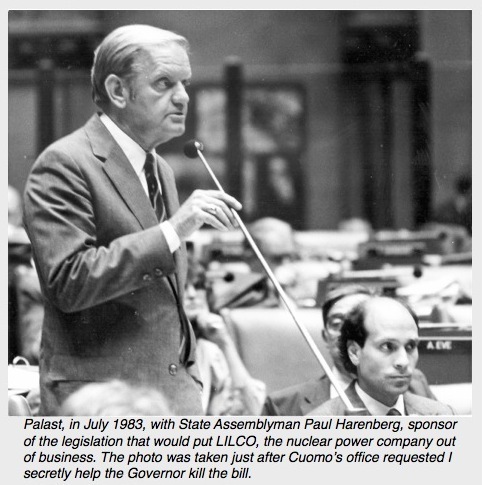 After nearly a decade of investigation, I recommended that the government bring civil racketeering charges against the builders of the Shoreham nuclear plant, for, among other frauds, falsifying records on the plant’s earthquake safety and emergency diesel generators. [See the “Fukushima, Texas” chapter in “Vultures Picnic.”] Charges were brought, and a federal jury found the nuclear industry bigs liable for conspiracy, fraud, and racketeering.
After nearly a decade of investigation, I recommended that the government bring civil racketeering charges against the builders of the Shoreham nuclear plant, for, among other frauds, falsifying records on the plant’s earthquake safety and emergency diesel generators. [See the “Fukushima, Texas” chapter in “Vultures Picnic.”] Charges were brought, and a federal jury found the nuclear industry bigs liable for conspiracy, fraud, and racketeering.
The jury award would cost the plant owner $4.3 billion.
In public Governor Cuomo praised the jury verdict; but behind the scenes the other Cuomo went to work, scheming in back rooms to cut the award and save the company from bankruptcy—and save the banks that held its bonds. Daily, the judge’s master would tell us, “The Governor called again.” There’s nothing corrupt or illegal about the Governor secretly calling the judge’s chamber, just two-faced and sickening.
Cuomo won. He got the case settled, over the objections of the officials and activists who had brought the charges, for less than a dime on the dollar. The public got shafted out of billions, and the company and banks were saved.
Cuomo took full credit for putting the rogue company out of business, for closing the plant and buying it for just $1. It was a great speech—a great fairy tale.
Cuomo's little games meant the nuclear plant would cost the public billions of dollars, not a buck. When I tactfully explained this uncomfortable fact to the Governor, he responded with an Italian gesture that cannot be translated in a family newspaper.
But duplicity has its price and the Devil has the last laugh. While Cuomo was pleasing the bankers in private while publicly waving the liberal anti-corporate banner, a much brighter politician in Arkansas both pleased the bankers and sang their praises. The bankers’ favorite, their champion of the deregulation that Reagan could never dream of accomplishing, became President. And Cuomo spent his last, bitter years trying to hush up those like me who cast a shadow on his fabricated Glory Days.
Let me name a few of those who did close the Shoreham nuclear plant: Peter Maniscalco, Nancy Newell, Steve Liss, the Hon. Wayne Prospect and the Hon. Paul Harenberg. I name them here because I doubt their obituaries will make the front page of The Times. They are the heroes, all of them bullied by Cuomo but unbowed. I cherish them for their actions, not their speeches.
It is the harsh and uncomforting work of a journalist to reveal the unforgiving facts when history is falsified. It’s a task I would rather avoid, especially now that The Governor’s great, golden voice, the voice that spoke for the working person, is silenced forever.
The conflicted soul he carried within him must have been a terrifying burden.
Now, may you rest in peace, Mario Cuomo. Both of you.
* * * * *
Greg Palast is the author of the New York Times bestsellers Billionaires & Ballot Bandits the The Best Democracy Money Can Buy and the highly acclaimed Vultures' Picnic.
Make a tax-deductible donation and keep our work alive.
Subscribe to Palast's Newsletter and podcasts.
Follow Palast on Facebook and Twitter.
December 10, 2014
Palast wins Sidney Prize for Exposing New Threat to Voters of Color
From the Sidney Hillman Foundation
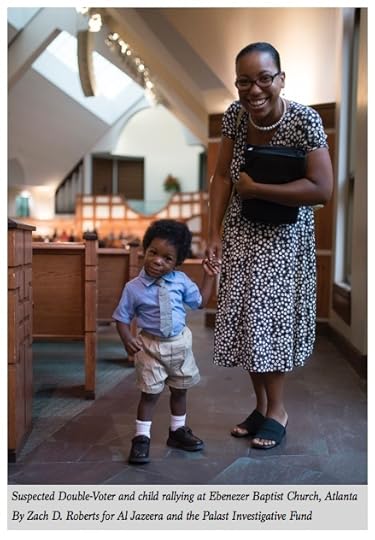 NEW YORK – Greg Palast wins the December Sidney Award for “Jim Crow Returns,” and “Challenging Crosscheck,” a two-part Al Jazeera America exposé that shows how millions of innocent people were flagged as suspected vote fraudsters just because they have the same first and last name as someone in another state.
NEW YORK – Greg Palast wins the December Sidney Award for “Jim Crow Returns,” and “Challenging Crosscheck,” a two-part Al Jazeera America exposé that shows how millions of innocent people were flagged as suspected vote fraudsters just because they have the same first and last name as someone in another state.
On the eve of the 2014 elections, officials had begun to purge voters based upon Interstate Crosscheck, voter fraud prevention software. More than 40,000 voters were dropped from the rolls in Virginia alone.
Read The Backstory, our Q&A with Greg Palast
The Crosscheck program, used in 28 states, is ostensibly designed to prevent voter fraud by identifying people who voted in different states in the same election. The system is billed as a sophisticated fraud-detection tool, but Crosscheck lists obtained by Palast for three states show that the system matches on first and last name alone. Crosscheck flagged more than 2 million names in those three states, Palast found.
“It was absolute murder trying to get the Crosscheck lists out of the hands of these highly political agencies,” Palast said. “They knew damn well the lists were phonies—just common ethnic names, an excuse to knock off Democrats—and dynamite if exposed.”
One more prize and we’re bankrupt!
I am truly honored to receive this prestigious award. But that don’t pay the bills. It took six months of a team of six of us to lift the Crosscheck purge lists from the locked file cabinets of Secretaries of State who’d make Katherine Harris look like Thomas Jefferson.
We have ambitious plans for 2015, with investigations insanely difficult (and none too cheap) to execute.
Next: Our latest from our Billionaires & Ballot Bandits investigation will be released as a print series and FILM.
Please support the continuation of this crucial work with tax-deductible donation to the Palast Investigative Fund.
You can also browse our signed gifts for the holidays.
And we need 12 Donors who can give $1,000 or more.
You will get a Producer credit in the new film.
If you ever thought of helping, now is truly the moment.
With appreciation and holiday wishes –Greg and the team
In the states Palast studied, anyone with a common name is at risk, but the system disproportionately flags voters of color: If you’re white, you have a 1 in 11 chance of being flagged. If you’re Asian or Hispanic, your odds are 1 in 8. If you’re black, the odds are 1 in 7 that someone in another Crosscheck state shares your first and last name.
Check Al Jazeera’s interactive database to see if your name is in on the list.
“Greg Palast has uncovered a major threat to voting rights,” said Sidney judge Lindsay Beyerstein. “Crosscheck is casting unwarranted suspicion on innocent people and endangering their right to vote.”
 Greg Palast produces investigative reports for the Guardian, BBC TV, and other outlets. Before becoming a reporter, he was an investigator of corporate crime and racketeering for governments and labor unions worldwide. He is the author of several books including “The Best Democracy Money Can Buy” and “Vulture’s Picnic.”
Greg Palast produces investigative reports for the Guardian, BBC TV, and other outlets. Before becoming a reporter, he was an investigator of corporate crime and racketeering for governments and labor unions worldwide. He is the author of several books including “The Best Democracy Money Can Buy” and “Vulture’s Picnic.”
“Jim Crow Returns” was produced by Alex Newman, Steve Melendez, Tate Strickland, John Thomason, and Lam Thuy Vo, edited by Mark Rykoff and Jayati Vora, with photographs by Zach D. Roberts and interactive production by Alex Newman.
Al Jazeera America’s broadcast of "Crosscheck" was produced by Hanaan Sarhan, with Richard Rowley as director of photography.
* * * * * * *
The Sidney Hillman Foundation honors excellence in journalism in service of the common good. Judges are Rose Arce, Ta-Nehisi Coates, Hendrik Hertzberg, Katrina vanden Heuvel, Harold Meyerson and Lindsay Beyerstein.
The Sidney Award is given once a month to an outstanding piece of journalism about social or economic injustice, by the Sidney Hillman Foundation, which also awards the annual Hillman Prizes every spring. Winners of the Sidney receive a certificate designed by New Yorker cartoonist, Edward Sorel, a $500 honorarium and a bottle of union-made wine.
* * * * * * *
For 15 years, Greg Palast has been uncovering voter suppression tactics in investigative reports for BBC Television, The Guardian, Harper’s and Rolling Stone.
Greg Palast is the author of several New York Times bestsellers including The Best Democracy Money Can Buy and Billionaires & Ballot Bandits.
Make a tax-deductible donation and support our ongoing investigation into voter suppression.
Subscribe to Palast's Newsletter and podcasts.
Follow Palast on Facebook and Twitter.
November 24, 2014
The Hunt Continues... A personal note from Greg Palast
Three weeks ago, we blew the lid off “Interstate Crosscheck”—the 6.9 million voter purge list put together by 27 wannabe Katherine Harrises.
It took us six months of detective work to get our hands on these lists of millions of Americans tagged as 'suspected double-voters' – and the sneaky and sick method used to disenfranchise more voters of color. But the Purge’n Generals are not done. So far, they’ve only knocked off a few hundred thousand voters. That was enough to flip the Senate; but they’re in the process of removing nearly a million voters by 2016 to get the White House.
But the Purge’n Generals are not done. So far, they’ve only knocked off a few hundred thousand voters. That was enough to flip the Senate; but they’re in the process of removing nearly a million voters by 2016 to get the White House.
We’re not done either: We are still digging, still uncovering more games like Crosscheck—and the billionaires behind the vote swindles.
We need your support to continue the investigation of these ballot bandits – and expose all their tricks.
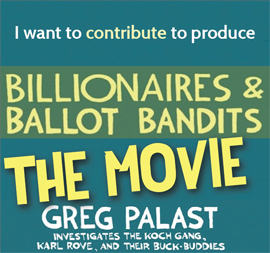 We are halfway through our production of Billionaires & Ballot Bandits - The Movie, based on my New York Times bestseller.
We are halfway through our production of Billionaires & Ballot Bandits - The Movie, based on my New York Times bestseller.
Let me be blunt: We’ve depleted our funds—but we can’t stop now.
I rarely ask – but I have to ask now...
Help us complete the film by making a tax-deductible donation of $100 or more and you will get an on-screen credit as a Supporter plus the signed DVD once the film has wrapped.
Or make a tax-deductible donation of $50 –– and, once the film has wrapped, you will receive the signed DVD.
 Or chip in whatever you can to help us get it done.
Or chip in whatever you can to help us get it done.
For those with deeper pockets, we really need Producers.
For a tax-deductible donation of $1,000 or more you will get an on-screen Producer credit, or a Co-Producer credit for a donation of $500. (You can, of course, choose to remain anonymous.)
Or, for a donation or $40 get a signed DVD of my investigations compendium Vultures and Vote Rustlers (Palast Investigates Vol. 2).
Better yet, get the signed DVD combo of Palast Investigates Vol. 1 & 2 for a donation of $65.
Or donate $50 and get a signed copy of my New York Times bestseller Billionaires & Ballot Bandits.
You can also visit our store and check out our Gift Packs, Books, DVDs and Downloads – or simply support our work by making a no-gift donation for whatever amount you can spare.
Our Crosscheck exposé got big applause and re-telling in the New York Times, LA Times—indeed, media all over the planet.
Esquire wrote: “Palast has been on the voter-caging story ever since people like Pastor Whiting got screwed 14 years ago. And, this week, writing for the Al Jazeera America news site, Palast dropped a bomb into [the Mid-Term] elections that has left credibility shrapnel all over the democratic process, if anyone cares to look for it.”
Thank you. But that don’t pay the bills. “Greg Palast” is not a person but a team of investigators and journalists including the Academy Award nominee Richard Rowley, gonzo photojournalist Zach D. Roberts and the extraordinary Ms. Badpenny and others. They all need food, shelter and memory chips.
[If you haven’t seen the Crosscheck report, watch the Democracy Now replay; and read it here.]
Will you support our efforts? Yes, our TV and print outlets cover some costs. And we are grateful for crucial support from Puffin and Cloud Mountain foundations. But we are, ultimately, citizen funded: without your help there is just no way we can do the unique, deep detective work that makes our reports like no one else’s.
And it’s not just ballot trickery that we expose. We have the investigative skills to crawl into the file drawers of the rich and shameless: the billionaires who fund the ballot-bending shenanigans. (Wait until you hear my Koch Brothers tape.)
Whether it’s exposing disenfranchisement games, the vulture financiers or petroleum porkers behind the poisoning of the body politic, no other news team has produced so many investigative bombshells year after year.
We’re ready to keep digging: please hand us the shovels by donating right now.
And, on behalf of a tired, hungry crew, our true thanks for your years of support.
Yours, with gratitude,

* * * * * *
For 15 years, Greg Palast has been uncovering voter suppression tactics in investigative reports for BBC Television, The Guardian, Harper’s and Rolling Stone.
Greg Palast is the author of several New York Times bestsellers including The Best Democracy Money Can Buy and Billionaires & Ballot Bandits.
Get a signed copy of Palast's latest film Vultures and Vote Rustlers.
Make a tax-deductible donation and support our ongoing investigation into voter suppression.
Subscribe to Palast's Newsletter and podcasts.
Follow Palast on Facebook and Twitter.
Greg Palast and Brad Friedman Expose the Midterm Election Swindle on Thom Hartmann’s ‘Big Picture'
* * * * * *
For 15 years, Greg Palast has been uncovering voter suppression tactics in investigative reports for BBC Television, The Guardian, Harper’s and Rolling Stone.
Greg Palast is the author of several New York Times bestsellers including The Best Democracy Money Can Buy and Billionaires & Ballot Bandits.
Get a signed copy of Palast's latest film Vultures and Vote Rustlers.
Make a tax-deductible donation and support our ongoing investigation into voter suppression.
Subscribe to Palast's Newsletter and podcasts.
Follow Palast on Facebook and Twitter.
November 18, 2014
The Secret Lists that Swiped the Senate
By Greg Palast
Statistics guru Nate Silver simply can’t understand why every single legitimate poll indicated that Democrats should have gotten 4% more votes in the midterm elections than appeared in the final count.
The answer, Nate, is “Crosscheck.”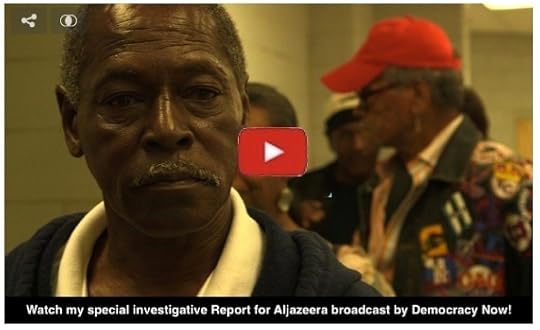 No question, Republicans trounced Democrats in the Midterm elections. But, if not for the boost of this voter-roll purge system used in 23 Republican-controlled states, the GOP could not have taken the US Senate.
No question, Republicans trounced Democrats in the Midterm elections. But, if not for the boost of this voter-roll purge system used in 23 Republican-controlled states, the GOP could not have taken the US Senate.
It took the Palast investigations team six months to get our hands on the raw files, fighting against every official trick to keep them hidden.
Here’s what we found.
Interstate Crosscheck is computer system that officials claim can identify anyone who commits the crime of voting twice in the same election in two different states. While the current list of seven million “suspects” did not yield a single conviction for double voting, Crosscheck did provide the grounds for removing the registrations of tens of thousands of voters in battleground states.
The purge proved decisive in North Carolina, Colorado, Kansas and elsewhere. Without Crosscheck, the GOP could not have taken control of the US Senate. [Read my original investigative report.]
Nate Silver might want to punch these numbers into his laptop:
In North Carolina, Republican Thom Tillis upset incumbent Senator Kay Hagan by just 48,511 votes. North Carolina’s Crosscheck purge list targeted a stunning 589,393 voters.
In Colorado, Cory Gardner, the Republican, defeated Mark Udall by just 49,729 votes. Colorado’s Crosscheck “potential double voter” list totals 300,842.
The Crosscheck purge list also swamped GOP Senate margins in Alaska and Georgia and likely provided the victory margins for GOP gubernatorial victories in Kansas and Massachusetts.
No, states do not purge every name on the lists. Typical is Virginia which proudly purged 64,581 “duplicates” from its voter rolls in 2013, equal to about 19% of its Crosscheck list. Other states refuse to provide numbers, but their scrub methods are the same, or even more aggressive, than Virginia’s.
We can conservatively calculate that the purge of 19% of the Crosscheck lists accounted for at least three GOP Senate victories – and thereby, control of the Senate.
If the Crosscheck lists truly identified fraudulent double voters, then we’d have to concede that the election results are legit. But the ugly truth is, the lists are nothing more than racially-loaded lists of common names.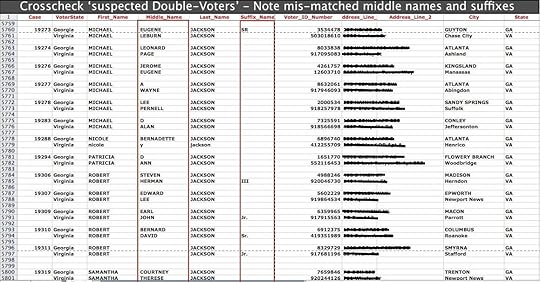 Click to Enlarge
Click to Enlarge
And that’s why GOP Secretaries of State, a gaggle of Katherine Harrises, hid the lists until we cracked through the official wall of denial and concealment. These election chieftains refused our demands for the lists on the grounds that these millions of voters are all suspects in a criminal investigation and so must remain confidential.
Eventually (and legally), we were able to get our hands on 2.1 million of the 6.9 million names—and had them analyzed by the same list experts who advise eBay and American Express.
What we found is simply a giant list of common names—a lot of voters named Michael Jackson, David Lee and Juan Rodriguez. The racial smell of it was apparent and awful. As the US Census tells us, African-Americans, Asian-Americans and Hispanics are 67% more likely to share a common name as a white American. In other words, the lists heavily targeted “blue” Americans, Democratic leaning voters.
While state officials claimed that the criminal double voters were matched by social security number and other key identifiers, we discovered that, in fact, they only matched first and last name. Nearly two million of the pairs of names lacked middle name matches. Example: James Elmer Barnes Jr. who voted in Georgia is supposed to be the same person as James Cross Barnes III of Virginia.
Republican officials have gone to great lengths to cover Crosscheck’s operations. Voters purged are not told they are accused of voting twice. The procedure, created by Kansas’ Republican Secretary of State Kris Kobach, is to send a postcard to each “duplicate” voter requiring them to re-verify their registration. A large percentage are never delivered—Americans, especially renters and lower-income Americans, move often—or cards are tossed away confused for junk mail.
Brad Friedman, the investigative reporter with encyclopedic knowledge of elections shenanigans, was also bemused by Nate Silver’s confusion over the missing Democratic four percent. He cites the Crosscheck purges we discovered and adds in all the other tried and true methods of bending the vote, from Photo ID restrictions to missing voter registrations and a deliberate shortage of paper ballots in minority precincts. In Georgia alone, 56,000 registration forms collected by a coalition of minority voting rights groups were simply not added to the voter rolls.
The Tool to Take 2016
The purge of those snared in the Crosscheck dragnet has only just begun. The process of actually removing names from the voter rolls is subtle and slow, involving several steps over many months. Some states mark their voters on the Crosscheck list as “inactive”— which means that, if they failed to vote in this midterm election, they will be blocked from voting in 2016. As a result, Crosscheck will take an even bigger bite out of the 2016 voter rolls.
This bodes ill for the upcoming Presidential contest when, once again, Ohio is expected to be decisive. Ohio’s Republican secretary of state, John Husted, has embraced Crosscheck.
We enlisted Columbus State University professor Robert Fitrakis, an expert in voting law to canvas county voting officials. He found these local elections officials concerned that the Republican Secretary of State is pushing counties to scrub voter rolls of “duplicates” within 30 days of receiving the names from the Secretary’s office. This gives counties little time and no resources to verify if an accused voter has, in fact, voted in a second state.
Secretary of State Husted has refused to give us the list of the 469,201 names on Ohio’s Crosscheck list—but we’ve obtained thousands anyway. We found that Ohio’s lists have the same glaring mismatches as we saw in the Virginia, North Carolina and Georgia lists.
We have now launched an investigation to uncover the names of all the voters Ohio plans to scrub from the registration rolls by 2016. The answer may well determine who will choose our next president: the voters or Crosscheck.
Please support our continuing investigation into Crosscheck and other election trickery. Make a tax-deductible donation of at least $40 and receive a signed copy of Vultures and Vote Rustlers Palast’s compendium of investigative reports. Or for $50 minimum donation, get a signed copy of Billionaires & Ballot Bandits.
Or become a credited Producer ($1,000 min.) or Co-Producer ($500 min.) on our upcoming film based on the book Billionaires & Ballot Bandits. Watch the trailer.
You can of course support our work for any amount you can afford, no matter how small or large. we appreciate it all.
* * * * * *
For 15 years, Greg Palast has been uncovering voter suppression tactics in investigative reports for BBC Television, The Guardian, Harper’s and Rolling Stone.
Greg Palast is the author of several New York Times bestsellers including The Best Democracy Money Can Buy and Billionaires & Ballot Bandits.
Get a signed copy of Palast's latest film Vultures and Vote Rustlers.
Make a tax-deductible donation and support our ongoing investigation into voter suppression.
Subscribe to Palast's Newsletter and podcasts.
Follow Palast on Facebook and Twitter.
November 4, 2014
Dispatch from Battleground North Carolina
By Greg Palast
Tuesday, 4. November, 2014
Jim Crow has risen from the crypt of Segregation. But now he’s working as Dr. James Crow, database expert. Read Greg Palast’s Election Day dispatch from Dixie, for Al Jazeera.
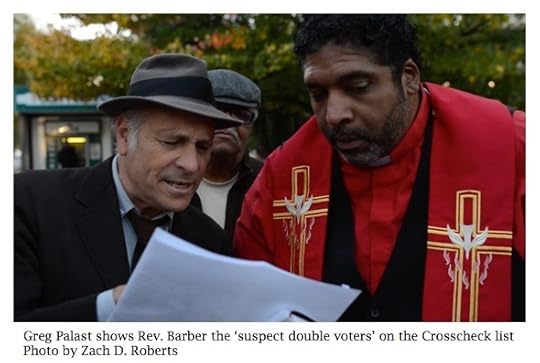
[Greensboro, NC] Here in Greensboro, Reverend Barber recites local history. It was in this small southern town that, in 1960, the beating of students conducting a sit-in at the local Woolworth’s launched the wave of non-violent protests that became the Civil Rights Movement. The state has made it an official tourist destination.
Rev. Barber’s rally also marks the 35th anniversary of the killing of five protesters by the remnants of the Ku Klux Klan, an event without a tourist marker. “We’ve been through too much to go backwards!" his is deep voice rising with the gospel sound of Sam Cooke’s “A Change is Gonna Come.”
Greensboro is the residence of an astonishing 3,735 voters who supposedly cast ballots in the presidential election illegally in both North Carolina and Virginia. Or, at least, that is how they are listed in the Interstate Crosscheck files.
Read today’s complete report for Al Jazeera, Voting-Rights Groups Challenge Electoral Purges, about the swift actions taken by voter groups across the South and across the nation to stop Interstate Crosscheck from bleaching the voter rolls whiter than white.
If you haven’t read Greg Palast’s original investigative report on Interstate Crosscheck, read it now, right here, "Jim Crow Returns,".
Also check out if your own name is on Crosscheck’s voter hit list.
Greg Palast is one of those inconveniently stubborn journalists – much like Glenn Greenwald and the late Gary Webb – who gets his teeth into a story and shakes it bloody right there in the middle of the parlor. And, this week, writing for the Al Jazeera America news site, Palast dropped a bomb into [today’s] elections that has left credibility shrapnel all over the democratic process, if anyone cares to look for it. –– Esquire Magazine
* * * * * *
For 15 years, Greg Palast has been uncovering voter suppression tactics in investigative reports for BBC Television, The Guardian, Harper’s and Rolling Stone.
Greg Palast is the author of several New York Times bestsellers including The Best Democracy Money Can Buy and Billionaires & Ballot Bandits.
Make a tax-deductible donation and support our ongoing investigation into voter suppression.
Get a signed copy of Palast's latest film Vultures and Vote Rustlers.
Subscribe to Palast's Newsletter and podcasts.
Follow Palast on Facebook and Twitter.
October 30, 2014
Look up your Name on the Crosscheck Voter Purge-List
By Greg Palast
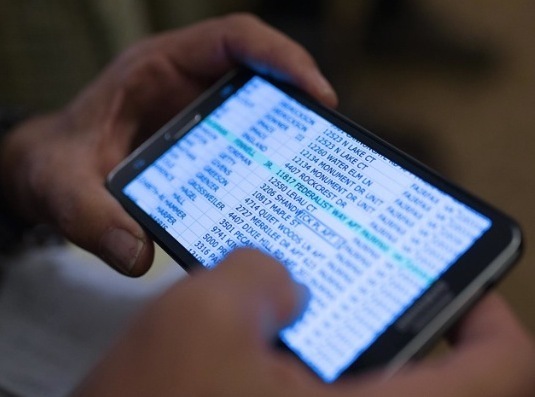 My investigative report, JIM CROW RETURNS: Millions of Minority Voters Threatened by Electoral Purge, is the most-read story ever on Al Jazeera America’s website.
My investigative report, JIM CROW RETURNS: Millions of Minority Voters Threatened by Electoral Purge, is the most-read story ever on Al Jazeera America’s website.
If you haven’t read it yet – the results of a six-month intensive investigation – read it now.
And tonight, Thursday, at 9pm, watch my reports on this investigation on Al Jazeera America's America Tonight (enter your zip code to find it on your TV).
The Palast team has ripped the lid off “Interstate Crosscheck” – a system used by 27 states, almost all under Republican control, which claims to find illegal “double voters,” those who vote in the same election in two different states.
It took us months, but we got our hands on 2.1 million of the names of the so-called “double voters” accused by Crosscheck.
Are YOU a criminal double voter?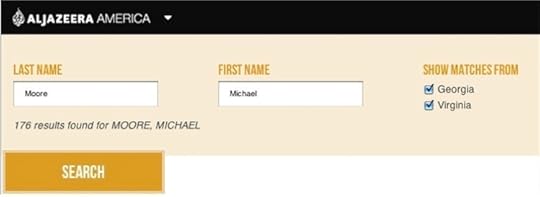 (Apparently, Michael Moore voted 176 times!)
(Apparently, Michael Moore voted 176 times!)
What we found is that Crosscheck is simply a list of common first and last names. And the list is a sloppy, absurd mess. Over a million and half of these alleged double voters have mis-matched middle names. Social security numbers are rare – and all mismatches ignored.
Here’s a random “double voter”: Chris Jarvis Jackson of Georgia supposedly is the same voter as Chris Laquon Jackson of Virginia.
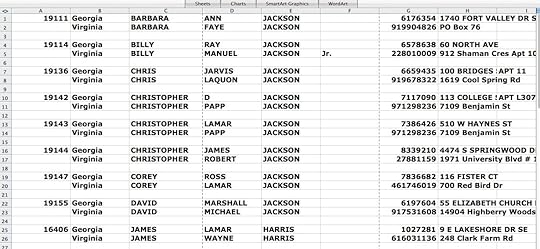 And guess the color of the double-voting criminals? ONE IN EIGHT VOTERS OF COLOR in the 27 Crosscheck states are on the list. Why? Because, says the US Census, Asian-Americans, Hispanics and African-Americans are 80% more likelyto share a common name (one of the top 1000 surnames) than a white American. Nearly a fifth of all Asian-Americans use one of just 30 names (Chung, Lee, Patel, Kim, Ho, Park etc.).
And guess the color of the double-voting criminals? ONE IN EIGHT VOTERS OF COLOR in the 27 Crosscheck states are on the list. Why? Because, says the US Census, Asian-Americans, Hispanics and African-Americans are 80% more likelyto share a common name (one of the top 1000 surnames) than a white American. Nearly a fifth of all Asian-Americans use one of just 30 names (Chung, Lee, Patel, Kim, Ho, Park etc.).
This new purge game, simply a bigger, uglier, yet more sophisticated version of Katherine Harris’ fake “felon” purge of 2000, can easily determine the control of the US Senate in this Tuesday’s races. Battleground state Georgia has tagged over half a million of its voters, especially Black and Asian-American citizens, as suspected criminal double voters.
North Carolina, where a Senate race is in the balance, is gunning for 190,000 voters, including, for example, Kevin Antonio Hayes of North Carolina—who supposedly voted a second time, in Virginia, as Kevin Thomas Hayes. I met one Mr. Hayes at his home in East Durham. He swears he has never used the middle name “Thomas” – and that he didn’t vote twice. Indeed, according to Crosscheck’s own records, he didn’t vote once!
Please pass on this note and these links—before you vote Tuesday.
* * * * * *
For 15 years, Greg Palast has been uncovering voter suppression tactics in investigative reports for BBC Television, The Guardian, Harper’s and Rolling Stone.
Greg Palast is the author of several New York Times bestsellers including The Best Democracy Money Can Buy and Billionaires & Ballot Bandits.
Get a signed copy of Palast's latest film Vultures and Vote Rustlers.
Make a tax-deductible donation and support our ongoing investigation into voter suppression.
Subscribe to Palast's Newsletter and podcasts.
Follow Palast on Facebook and Twitter.
October 29, 2014
GOP-led Purge Threat to 3.5 Million Voters
By Greg Palast for Al Jazeera America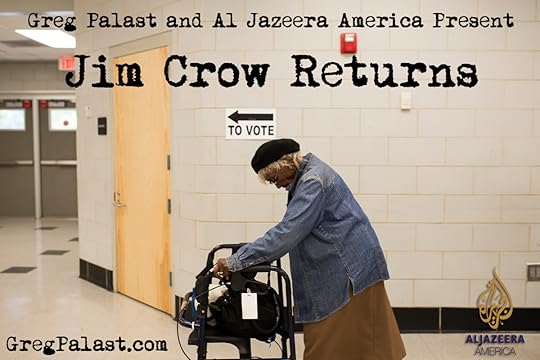 Election officials in 27 states, most of them Republicans, have launched a program that threatens a massive purge of voter rolls, especially targeting minority voters.
Election officials in 27 states, most of them Republicans, have launched a program that threatens a massive purge of voter rolls, especially targeting minority voters.
Al Jazeera America has obtained 2.1 million names from the target lists, kept confidential until now. Experts reviewing the lists conclude it is suspiciously over-weighted with Black, Hispanic and Asian-American voters.
The targeted voters have been tagged as “potential duplicate voters,” suspected of voting twice in the same election, in two different states, a felony crime punishable by 2-10 years in prison.
Until now, state officials conducting the purge have refused to turn over their lists on grounds that these voters are all subjects of a criminal investigation.
Read the full exposé
Watch the Trailer for the 2-part TV report
on Al Jazeera America Tonight,
tonight & Thursday night at 9pm ET
(check your local channel guide)
The match lists of suspected double voters, called Interstate Crosscheck, has been compiled for each state by Kansas’ controversial Republican Secretary of State, Kris Kobach.
The lists are rife with literally millions of obvious mis-matches:
Al Jazeera found that nearly a fourth (23% ) of the accused voters lack matching middle names.
For example, Kevin Thomas Hayes of Durham, North Carolina, is allegedly the same man who voted in Alexandria, Virginia, as Kevin Antonio Hayes.
“Jr.” and “Sr.” are regularly mismatched, potentially disenfranchising two generations in the same family.
While Kobach, in his public description of Crosscheck, claims that double voters are matched by Social Security number, in fact, internal documents admit that “Social Security numbers might or might not match.”
So far, no case has been made against a single one of the accused double-voters on the lists, though tens of thousands have already lost their right to vote based on inclusion in the lists.
North Carolina has hired a full-time former FBI agent to arrest double voters. However, because the match list of 190,000 suspects in that state is so recklessly compiled, the Board of Elections has admitted to Al Jazeera that not one voter has been charged with the crime of voting twice. Nevertheless, the Republican-controlled Board of Elections has begun the process of removing the registration of voters on the lists.
The lists are heavily over-weighted with names such as Jackson, Garcia, Patel and Kim, common to minorities who vote overwhelmingly Democratic. Indeed, one in seven African-Americans in those 27 states are listed as suspected of the crime of voting twice, one in eight Asian-Americans, and one in eight Hispanic voters. White voters too, one in eleven, are at risk, though not as vulnerable as minorities.
Georgia Democrats Angered by “Stealthy” Purge
 Georgia’s Democratic leaders say they are shocked that they have been kept in the dark about the state’s use of Crosscheck purge lists — and the racial profile of the targeted voters.
Georgia’s Democratic leaders say they are shocked that they have been kept in the dark about the state’s use of Crosscheck purge lists — and the racial profile of the targeted voters.
“It’s biased, I think, both in form and intent,” says Rep. Stacey Abrams, leader of the Democrats in the Georgia state legislature. “But more concerning to me, is the fact this is being done stealthfully. We have never had this information presented to us.”
“It’s Jim Crow all over again,” says Rev. Joseph Lowery, who succeeded Martin Luther King as chairman of the Southern Christian Leadership Conference. Lowery, now 93, says he recognizes in the list of threatened voters a sophisticated new form of an old and tired tactic. “I think [the Republicans] would use anything they can find. Their desperation is rising.”
Read the entire investigative exposé by Greg Palast at Al Jazeera.
* * * * * *
For 15 years, Greg Palast has been uncovering voter suppression tactics in investigative reports for BBC Television, The Guardian, Harper’s and Rolling Stone.
Greg Palast is the author of several New York Times bestsellers including The Best Democracy Money Can Buy and Billionaires & Ballot Bandits.
Get a signed copy of Palast's latest film Vultures and Vote Rustlers.
Make a tax-deductible donation and support our ongoing investigation into voter suppression.
Subscribe to Palast's Newsletter and podcasts.
Follow Palast on Facebook and Twitter.
October 27, 2014
Palast's Biggest Exposé Ever 3.5 Million Voters Threatened with Purge
The removals, which target minority voters,
were begun in secret in the battleground state of Georgia
Atlanta, Georgia – A six-month-long nationwide investigation by Al Jazeera America has discovered that voting officials in 27 states, almost all of them Republicans, have launched what is threatening to become a massive purge of black, Hispanic and Asian-American voters. Already, tens of thousands have been removed from voter rolls in battleground states, and the numbers are set to climb.
Read the full story on America.AlJazeera.com.
Also watch the two-part exposé on "America Tonight" on Al Jazeera America
Oct. 29 & Oct 30 - 9pm ET. (check your local channel guide)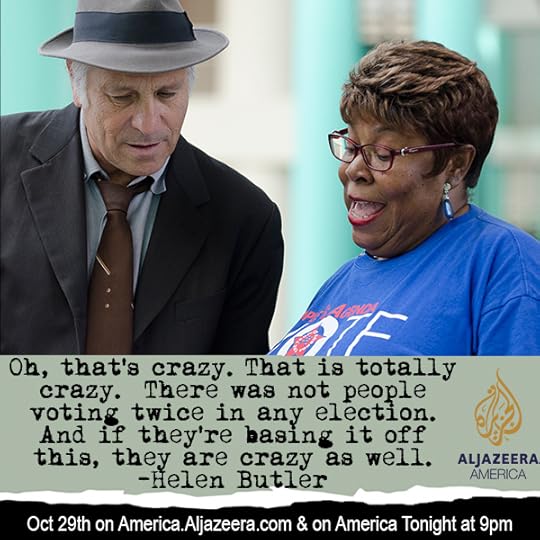
* * * * * * * * * *
Greg Palast, available to media at interviews (at) gregpalast.com, was the reporter who, for BBC TV and The Guardian, broke the story in 2000 of Katherine Harris' wrongful purge of innocent black voters as "felons".
Subscribe to Palast's Newsletter and podcasts.
Follow Palast on Facebook and Twitter.
Greg Palast's Blog
- Greg Palast's profile
- 138 followers


